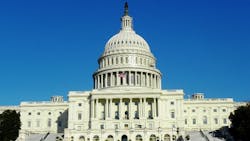Business Economists Oppose Full Budget Sequestration
More than 70% of business economists surveyed oppose the full implementation of the budget sequester that went into effect on March 1. However, economists were even more in favor (94%) of Congress enacting policies to bring about further deficit reduction over the coming 10 years.
In a survey of members, the National Association for Business Economics found that most members support deficit reduction through cuts in entitlement programs. About 30% said deficit reduction should focus on defense spending. Members also favored individual income tax reform, with the majority supporting reforms that raised revenue slightly.
Two out of three NABE members favored a reduction in corporate tax rates, but they did not express a strong view on moving to a territorial system of corporate taxation, which would exempt U.S. companies from taxation on income earned outside the U.S. The Obama administration has signaled a willingness to shift to some version of a territorial system as part of a larger budget deal.
The economists surveyed said current U.S. fiscal policy was either “too restrictive” (35%) or “about right” (35%), while the remaining 30% said policy is “too stimulative.” Nearly 80% of those polled said uncertainty regarding fiscal policy is contributing to a slower economic recovery.
While two-thirds of the economists said quantitative easing by the Federal Reserve had been a success, the same majority thought the Fed should end the purchase of assets later this year.
Support for approval of the Keystone XL pipeline grew in this semiannual survey, with 78% of economists in favor of the pipeline that would transport oil from Canada to refineries on the U.S. Gulf Coast. Just over half the NABE economists said national regulations should be enacted for hydraulic fracturing (fracking). Economists were divided over federal subsidies for alternative fuels (wind, solar, geo-thermal), with 51% supporting continued subsidies and 43% opposed.
About the Author
Steve Minter
Steve Minter, Executive Editor
Focus: Leadership, Global Economy, Energy
Call: 216-931-9281
Follow on Twitter: @SgMinterIW
An award-winning editor, Executive Editor Steve Minter covers leadership, global economic and trade issues and energy, tackling subject matter ranging from CEO profiles and leadership theories to economic trends and energy policy. As well, he supervises content development for editorial products including the magazine, IndustryWeek.com, research and information products, and conferences.
Before joining the IW staff, Steve was publisher and editorial director of Penton Media’s EHS Today, where he was instrumental in the development of the Champions of Safety and America’s Safest Companies recognition programs.
Steve received his B.A. in English from Oberlin College. He is married and has two adult children.
